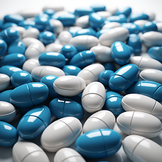How to overcome erectile dysfunction after prostate surgery?
- Understanding Erectile Dysfunction and Prostate Surgery
- Penile Rehabilitation and Preserving Penile Blood Vessels and Tissues
- Alternative Pharmacotherapies: Intraurethral Suppositories and Intracavernous Injections
- Lifestyle Changes: Quitting Smoking and Reducing Alcohol Consumption
- Nerve-Sparing Surgery and Its Impact on Erectile Function Recovery
- Penile Prosthesis as a Treatment Option
- Vacuum Erection Devices (VED) and Prostaglandin E1
- The Importance of Support from a Loving and Understanding Partner
- Oral Medications: Sildenafil, Vardenafil, and Tadalafil
- The Role of Cavernous Nerves in Erectile Function
- Consulting a Doctor for Specialized Erectile Dysfunction Treatments
- Overcoming Erectile Dysfunction After Prostate Surgery
- Erectile Dysfunction After Prostatectomy
- Pleasuring a Man After Prostatectomy
- Common Treatments for Erectile Dysfunction After Prostate Surgery
- ED Duration After Prostate Surgery

Understanding Erectile Dysfunction and Prostate Surgery
Erectile dysfunction (ED) refers to the inability to achieve or maintain an erection sufficient for satisfactory sexual performance. Prostate surgery, specifically radical prostatectomy, involves the complete removal of the prostate gland and can often result in erectile dysfunction due to damage to the nerves surrounding the prostate.
Penile Rehabilitation and Preserving Penile Blood Vessels and Tissues
Following prostate surgery, penile rehabilitation programs are recommended. They aim to restore erectile function by preserving penile blood vessels and tissues, and preventing penile shrinkage that can occur as a result of prolonged erectile inactivity. Penile rehabilitation involves the regular use of medications or vacuum erection devices (VED) to stimulate blood flow to the penis, maintaining tissue health.
Alternative Pharmacotherapies: Intraurethral Suppositories and Intracavernous Injections
In cases where oral medications aren't effective, alternative pharmacotherapies like intraurethral suppositories and intracavernous injections can be considered. Intraurethral suppositories involve the application of the medication into the urethra, while intracavernous injections involve direct injection of the medication into the penile tissues.
Lifestyle Changes: Quitting Smoking and Reducing Alcohol Consumption
Alongside medical treatments, lifestyle changes can significantly improve erectile function. Quitting smoking and reducing alcohol consumption are two such modifications that can enhance blood flow throughout the body, including to the penis, thereby improving erectile function.
Nerve-Sparing Surgery and Its Impact on Erectile Function Recovery
Nerve-sparing surgery, a technique used during prostatectomy, attempts to preserve the cavernous nerves that are vital for erectile function. This surgery can significantly improve the odds of recovering erectile function after prostate surgery. However, it is not always possible to use this technique, depending on factors such as the size and location of the cancer.
Penile Prosthesis as a Treatment Option
In instances where other treatments have been unsuccessful, a penile prosthesis can be considered. This is a device implanted into the penis, allowing men to achieve an erection mechanically. The two main types are inflatable and malleable (rigid) prostheses, both offering different benefits depending on the user's needs and lifestyle.
Vacuum Erection Devices (VED) and Prostaglandin E1
Vacuum erection devices are another treatment option.
These devices work by creating a vacuum around the penis, encouraging blood flow and thus producing an erection.Prostaglandin E1, a vasodilator, can be used in conjunction with VED to enhance blood flow to the penis.
The Importance of Support from a Loving and Understanding Partner
Emotional and psychological support from a loving and understanding partner plays a critical role in managing erectile dysfunction after prostate surgery. Open communication, understanding, patience, and exploring other forms of intimacy can significantly help in coping with and overcoming ED.
Oral Medications: Sildenafil, Vardenafil, and Tadalafil
Oral medications, such as sildenafil, vardenafil, and tadalafil, are often the first line of treatment for ED after prostate surgery. These drugs, known as PDE5 inhibitors, work by enhancing the effects of nitric oxide, a natural chemical the body produces to relax muscles in the penis and increase blood flow.
The Role of Cavernous Nerves in Erectile Function
Cavernous nerves play a critical role in erectile function. They are responsible for the transmission of signals from the brain to the penile muscles, initiating the process of erection. Damage to these nerves during prostate surgery can lead to erectile dysfunction.
Consulting a Doctor for Specialized Erectile Dysfunction Treatments
If erectile dysfunction persists after implementing initial treatments and lifestyle changes, it's essential to consult with a doctor or a specialist in men's sexual health. There are many advanced treatments available that can be tailored to your specific needs and circumstances.
Overcoming Erectile Dysfunction After Prostate Surgery
Overcoming erectile dysfunction after prostate surgery is often possible with a combination of treatments, lifestyle changes, and emotional support. From penile rehabilitation programs and pharmacotherapies to vacuum erection devices and penile prosthesis, multiple avenues can be explored to manage and possibly overcome ED.
Erectile Dysfunction After Prostatectomy
It's important to note that while many men may experience temporary ED following prostatectomy, the condition does not necessarily become permanent. The recovery time can vary significantly depending on factors like age, overall health, and whether nerve-sparing surgery was possible. In some cases, erectile function can gradually improve over a period of 12 to 24 months post-surgery.
Pleasuring a Man After Prostatectomy
While erectile function may be compromised after prostate surgery, it does not mean the end of sexual pleasure or intimacy. Non-penetrative forms of sexual activity, use of erectile aids, and exploring new forms of intimacy can all contribute to a satisfying sex life after prostate surgery.
Common Treatments for Erectile Dysfunction After Prostate Surgery
Common treatments for erectile dysfunction after prostate surgery include oral medications like sildenafil, vardenafil, and tadalafil, penile rehabilitation, vacuum erection devices, and lifestyle changes like quitting smoking and reducing alcohol consumption. In cases where these aren't effective, alternative therapies like penile prosthesis, intraurethral suppositories, and intracavernous injections can be considered.
ED Duration After Prostate Surgery
The duration of ED after prostate surgery can vary widely. Some men may regain erectile function within a few months, while others might take a couple of years. This timeline can be influenced by a variety of factors, including the patient's age, overall health, and whether nerve-sparing surgery was performed.



